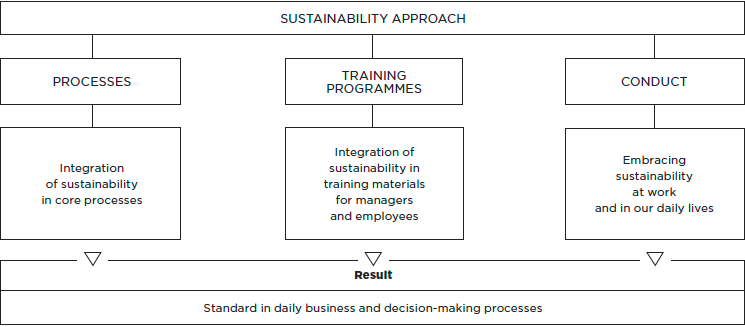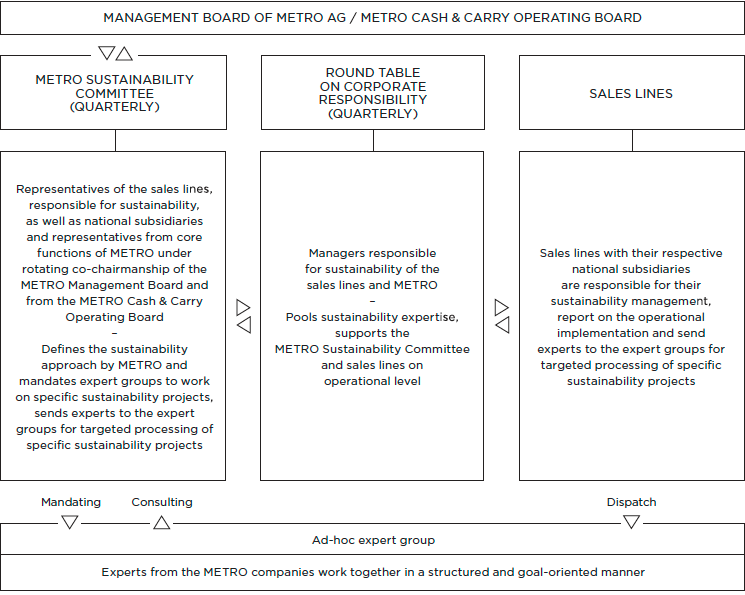Sustainability management
In 2015, the United Nations declared the global community’s Sustainable Development Goals (SDGs). A detailed global agenda was provided to assist governments, companies and private individuals in reaching the overall 17 goals required to achieve a sustainable development on an economic, social and environmental level. Also METRO considers itself an active member of the global community and strives to contribute to the creation of additional value and thereby the attainment of the SDGs. As companies, we have a moral obligation to balance our economic interests with both social demands as well as the demands of our customers, employees, investors and business partners and to not limit our efforts to the requirements imposed on us by the legislator. We must respect the limits placed on us by humanity and the natural environment. For us, sustainability does not stop at focusing on environmental and social issues. The notion of sustainability encompasses every single aspect of our actions and is a fixed item on the agenda of our corporate strategy. Our thinking and actions go well beyond the next day. We strive to be an attractive employer for our employees and a reliable and service-focused system partner for our customers over the long term. We seek to facilitate the long-term success of our customers by making our expertise, products and solutions available for their benefit. Accordingly, our business activities are designed to create added value while reducing negative effects. This makes all aspects of our business sustainable. This is what drives us. This contributes to reaching a new level of sustainability in the food and food services industry.
We act sustainably for … |
|
This is how we do it. |
|
Into which SDGs1 we put most of our efforts. |
|
What these goals require/mean. |
|||
|
|||||||||
… the environment – in our own business operations for procurement and assortment management. |
|
We use resources responsibly in our own operations and avoid waste wherever we can. This is how we minimise our impact on the climate and protect the environment. A sustainable procurement process and product range further contribute to preserving precious resources for the future. This is how we help create a sound foundation for the retail of tomorrow |
|
|
|
7 |
Ensure access to affordable, reliable, sustainable and up-to-date energy for all. |
||
|
|
|
8 |
Promote durable, inclusive and sustainable economic growth, productive full-time employment and dignified work for all. |
|||||
|
|
|
9 |
Build a resilient infrastructure, promote inclusive and sustainable industrialisation and support innovation. |
|||||
|
|
|
13 |
Take immediate action to combat climate change and its effects. |
|||||
… our customers – in regards to consumption. |
|
We provide our customers worldwide with locally sourced, safe, quality products through sustainable procurement and assortment. And with products that are produced, processed and recycled in a socially responsible, environmentally sound and resource-friendly manner. This is how we secure our future and promote sustainable consumption. |
|
|
|
12 |
Ensure sustainable consumption and production behaviour. |
||
|
|
|
14 |
Preserve oceans, seas and marine resources and ensure sustainable development. |
|||||
|
|
|
15 |
Protect and restore terrestrial ecosystems and promote their sustainable use. Sustainably manage forests, prevent deserti fication, halt and reverse soil degradation and stop biodiversity loss. |
|||||
… for the people who work for us – in procurement and assortment management. |
|
We operate our business fairly and responsibly and ensure fair living and working conditions. This is how we demonstrate responsibility in the supply chain. |
|
|
|
1 |
End poverty in every way and everywhere. |
||
|
|
|
2 |
End hunger, improve food safety and nutrition, and promote sustainable agriculture. |
|||||
|
|
|
8 |
Promote durable, inclusive and sustainable economic growth, productive full-time employment and dignified work for all. |
|||||
|
|
|
10 |
Reduce inequality within and between states and countries. |
|||||
|
|
|
16 |
Promote peaceful and inclusive societies for sustainable development, provide fair justice systems to all people, and build effective, accountable and inclusive institutions at all levels. |
|||||
… for our employees. |
|
We respect, protect and support our employees at all times and build trusting relationships with them. We enable them to systematically integrate sustainability into their day-to-day operations and decisions. Thus, we create an attractive work environment that enables us to offer our customers optimal and sustainable solutions for their needs. |
|
|
|
1 |
End poverty in every way and everywhere. |
||
|
|
|
3 |
Ensure a healthy lifestyle for all people of all ages and support their well-being. |
|||||
|
|
|
4 |
Ensure inclusive, just, high-quality education and promote lifelong learning opportunities for all. |
|||||
|
|
|
5 |
Achieve gender equality and empowerment for all women and girls. |
|||||
… for the benefit of society. |
|
We align our business with the needs of society through stakeholder dialogue based on mutual trust and by contributing to our local communities wherever we operate. This is how we work on solutions to global challenges and contribute to sustainable development. |
|
|
|
1 |
End poverty in every way and everywhere. |
||
|
|
|
2 |
End hunger, improve food safety and nutrition, and promote sustainable agriculture. |
|||||
|
|
|
17 |
Strengthen implementation tools and revitalise the global partnership for sustainable development. |
|||||
Embedding sustainability
To achieve our ambitious goals, we have embedded the notion of sustainability in our core business strategy. The implementation of this strategy is the responsibility of METRO’s Sustainability Committee and its subcommittees. We also adapt relevant business processes and decision-making procedures and proactively involve our employees. We want each individual to ultimately appreciate the significance of sustainability, both personally and in the professional environment and adjust his or her personal conduct accordingly. While METRO may be able to drive the issue in a top-down approach, it can only come to fruition once it is embraced by everyone in the company.
- More information about sustainability-related employee communication is available online at www.metroag.de/responsibility. For general information about our personnel, see chapter 2.5 employees in this METRO annual report.
Embedding sustainability

Issue |
|
Goals |
|
Status of goal attainment |
|
Measures |
|
Status of measures |
EMBEDDING SUSTAINABILITY WITHIN THE COMPANY |
|
METRO is systematically making sustainability an integral part of its daily operations. |
|
|
|
Continuous implementation of the sustainability related initiatives within our business processes (ongoing): METRO’s sustainability measures include specific guidelines, the group also considers sustainability aspects in its decision-making processes. As an example, we invest between €20 and 25 million each year in energy-saving measures. The monetary value of CO2 emissions is an important part of the decision-making process for investment applications. |
|
|
|
|
|
|
|
Sharpen employees’ understanding of sustainable behaviour. Driving sustainability campaigns.
|
|
|
|
|
|
|
|
|
Integration of the notion of sustainability into existing training programmes (partially completed).
|
|
|
Sustainability management
Sustainability management serves the purpose of systematically and structurally anchoring the notion of sustainability in our core business operations and to consider the interdependencies between economic, environmental and social aspects in an efficient, solution-driven manner. It is closely tied to our management of risks and opportunities. This enables the Management Board to systematically identify, evaluate and control deviations from the sustainability goals and the ensuing risks and opportunities.
- For more information about risk and opportunity management, see chapter 5 risk and opportunity report.
The METRO Sustainability Committee charts the strategic course for the entire company’s sustainability-related performance and develops targets for core issues.
The round table on corporate responsibility serves as the interface between the strategic and operational aspects of sustainability. This corporate body lays the groundwork for decisions taken by the Sustainability Committee and assists in their implementation. On the operational level, the sales lines are charged with defining specific goals and programmes, putting them into practice in their daily business operations and ensuring that the objectives are reached. They report their progress to the Sustainability Committee at the round-table meetings.
Our stakeholders use ratings to evaluate the sustainability measures carried out by METRO. These evaluations provide important motivation to us and serve as a management tool because they demonstrate the progress of and potential to improve our activities.
Oekom Corporate Rating awarded METRO in September 2017 the prime status C+ (on a scale from D- to A+). Financial year 2016/17 also saw the internationally renowned sustainability indexes Dow Jones Sustainability World and Europe ranking our group as the leading company in its sector for the third consecutive time. In the CDP Climate Scoring and the CDP Water Scoring, METRO was awarded a score of A- (scale from F to A) in October.
METRO sustainability committee

Degree of goal achievement
![]() Measure not yet started
Measure not yet started
![]() Measure started
Measure started
![]() Measure ongoing
Measure ongoing
![]() Measure concluded
Measure concluded
![]() New goal implemented
New goal implemented
![]() In progress
In progress
![]() Goal reached
Goal reached
![]() Goal not reached
Goal not reached



















